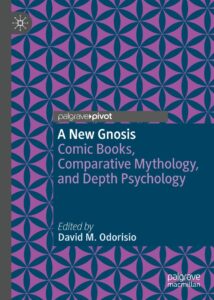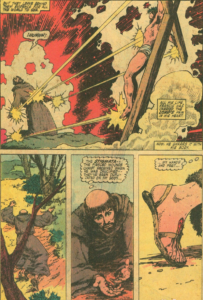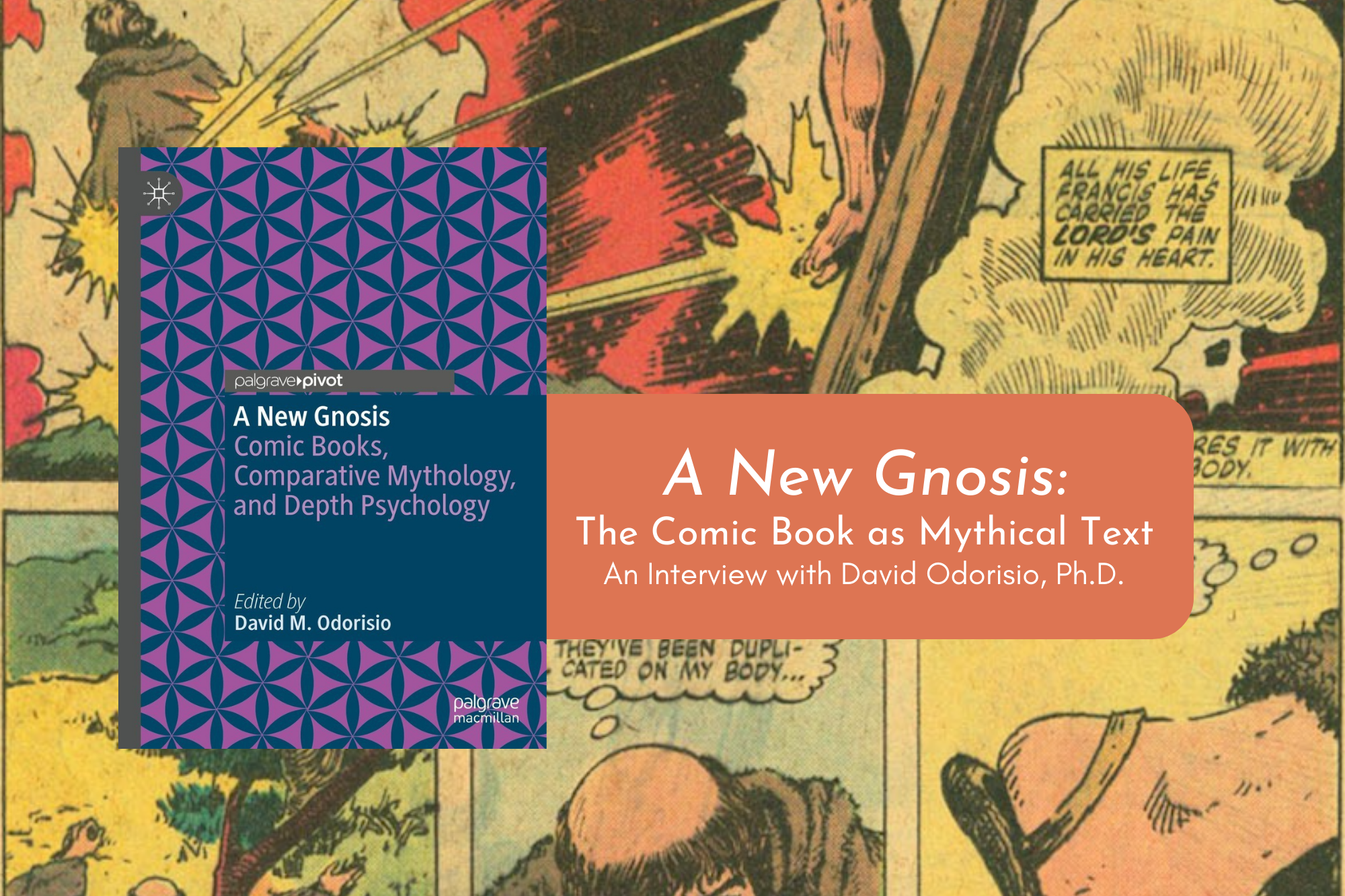 David M. Odorisio, PhD, is Co-Chair and Associate Core Faculty in Pacifica’s Mythological Studies graduate degree program. David is editor of A New Gnosis: Comic Books, Comparative Mythology, and Depth Psychology. I’m delighted to speak with him about his new book.
David M. Odorisio, PhD, is Co-Chair and Associate Core Faculty in Pacifica’s Mythological Studies graduate degree program. David is editor of A New Gnosis: Comic Books, Comparative Mythology, and Depth Psychology. I’m delighted to speak with him about his new book.
Angela: You’ve said that “Comic book authors and illustrators frequently incorporate mythical – and mystical – elements into their narratives and onto their pages, redefining the boundaries of what a comic book might convey and enhancing the medium’s potential for transmitting certain revelatory or ‘gnostic’” truths. Let’s start with the elephant in the room: gnosis. The last time I heard this term was in Hedwig and the Angry Inch, as one of the characters was named Tommy Gnosis. I thought it sounded cool, but didn’t know what it meant. What does gnosis mean in this context and how does it relate to comic books?
David: “Gnosis” is an ancient Greek term for knowledge, but a very specific kind of knowledge: a direct or immediate, intuitive awareness or knowing that oftentimes includes some sort of revelatory or divine download. It’s not just knowing in the sense of 2+2=4; it’s connected to a deeper sense of knowing, usually in a spiritual sense.
Over the past several decades, certain comic book authors have used the comic book medium as a platform for conveying spiritual knowledge or truths. Much of this volume focuses on authors who are intentional about encoding different symbols or using mythological figures and recasting them in more contemporary, modern, superhero roles.
Angela: What was the inspiration for choosing comic books as the focus of this collection of essays? You teach a course at Pacifica titled “Comic Books as Modern Mythology,” so I assume that this book is part of a longstanding interest in your academic life?
David: My background and focus of interest is actually comparative mysticism and the way that people experience and describe their mystical experiences in different religious traditions. One formative scholar in that field, Jeffrey Kripal, wrote a book called Mutants and Mystics, which interpreted comic book characters—mutants—as mystics, with different types of super-normal capacities. I fell in love with that book. I was into comic books as a kid, so I dove in, absorbed the material, and created the class about comic books and the myriad ways in which mythological and mystical material is encoded in visual form, which is one of the wonderful things about the medium. Kripal highlights all of this as well.
 Angela: What is an example of one of the comic book characters that is featured in the book?
Angela: What is an example of one of the comic book characters that is featured in the book?
David: One example is the essay by John Bucher, a graduate of the Pacifica Mythological Studies program, who wrote about “Swamp Thing.” His chapter, “Infirm Relatives and Boy Kings: The Green Man Archetype in Alan Moore’s The Saga of The Swamp Thing,” offers an archetypal analysis of Swamp Thing through the archetype of the Green Man, a prominent figure in many European mythologies. Other examples include looking at Superman as a messiah figure, almost as Jesus, or the superhero Flash as a retake of the Greek god Hermes. There’s tons of stuff like that, once you start to look for it. Mythical characters appearing in spandex. There are other authors writing about this; I wanted to do an edited collection to bring some more specific examples and “case studies” toward the forefront, specifically using the tools of depth psychology and comparative mythology.
Angela: In the course and book, you ask the hard questions, like “Do our gods wear spandex?” While few kids today could recite for you the names of Catholic Saints or the pantheon of Greek and Roman Gods, most have encyclopedic knowledge of the Marvel Universe movies or the X-Men franchise. What conclusions have you drawn and what are the ramifications of this? What would Jung have thought of Iron Man or Wolverine or even Wonder Woman’s latest incarnation?
David: The point I bring up, and I’m riffing off another scholar who has written about this, Christopher Knowles, is that religion isn’t working for most people today. The place where we see that is people, particularly younger, turning toward film and video games and comic books as a way to help them find meaning and make meaning out of life.
I think Jung would probably get behind the interpretation that the gods are reappearing to us in modern dress. I think he’d see how more institutionalized forms of religion are not providing people with the kinds of stories and myths that people need to make sense of their lives.
Angela: Is there anything else you’d like us to know about the book?
David: The book really presents and promotes the work of some of our students and alumni in the Mythological Studies program. Alongside John Bucher’s stellar essay on Swamp Thing, Amy Slonaker contributed a fascinating take documenting “Christian Hippie Comics of the 1970s”; Maile Kaku wrote an excellent chapter on all-female superhero teams; Jennifer Tronti offered a very interesting take on the recent book Little Bird from a ritual studies perspective, and artist and mythologist Li Sumpter contributed a powerful essay on “Worldbuilding and Soul Survival” through image and myth. I definitely want to highlight their contributions. Many of these students are currently writing their dissertations as well.
The other thing is that it was published through an academic press, and those books tend to be on the expensive side. So I want people to know it’s available through the Pacifica library as an e-book reserve, and there is a copy of the book that can be checked out. So Pacifica students can access it.
Angela: Thanks so much for speaking with me and best of luck with the book!
For more about Pacifica’s Mythological Studies graduate degree program, visit us here.

David M. Odorisio, PhD, is Co-Chair and Associate Core Faculty in Pacifica’s Mythological Studies graduate degree program. David is editor of A New Gnosis: Comic Books, Comparative Mythology, and Depth Psychology (Palgrave Macmillan, 2022), Merton and Hinduism: The Yoga of the Heart (Fons Vitae, 2021), and co-editor of Depth Psychology and Mysticism (Palgrave Macmillan, 2018). He has published in Quadrant, Jung Journal, Philosophy East and West, The Journal of Transpersonal Psychology, and The International Journal of Transpersonal Studies, among other peer-reviewed journals. He currently teaches the following courses in the Mythological Studies program: Methods and Contemporary Issues in Religious Studies; Christian Traditions; Comic Books as Modern Mythology; and Dissertation Formulation.

Angela Borda is a writer for Pacifica Graduate Institute, as well as the editor of the Santa Barbara Literary Journal. Her work has been published in Food & Home, Peregrine, Hurricanes & Swan Songs, Delirium Corridor, Still Arts Quarterly, Danse Macabre, and is forthcoming in The Tertiary Lodger and Running Wild Anthology of Stories, Vol. 5.


